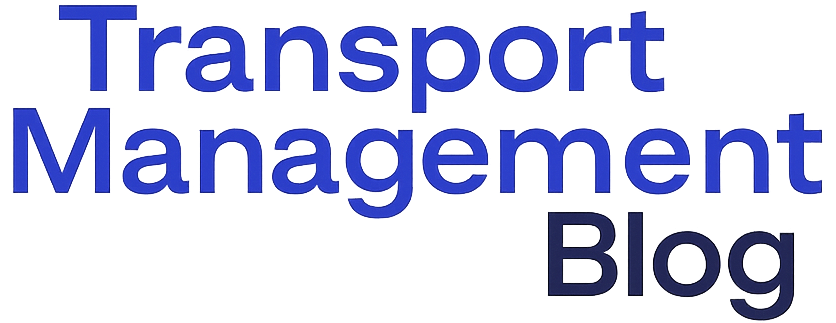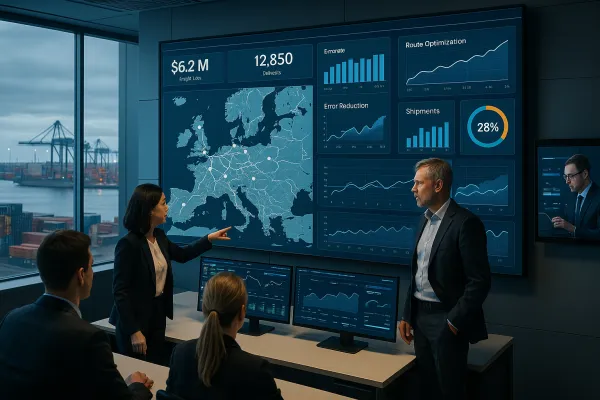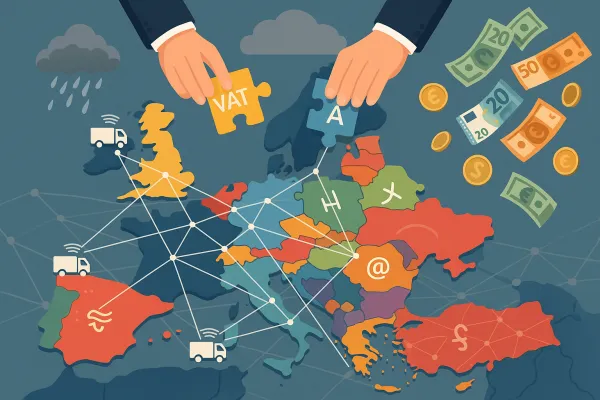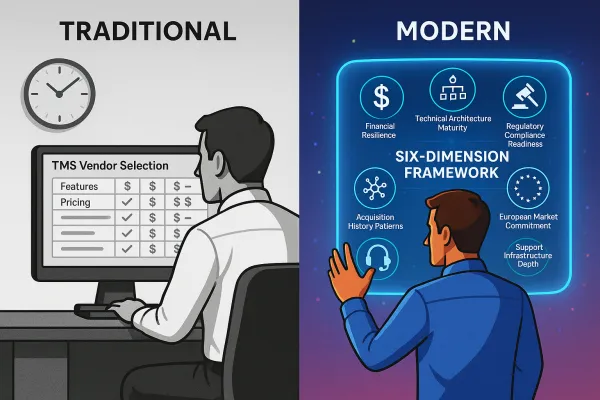The European Shipper's eFTI Readiness Guide: How to Choose TMS Platforms That Turn Digital Freight Documentation Requirements Into Competitive Advantage
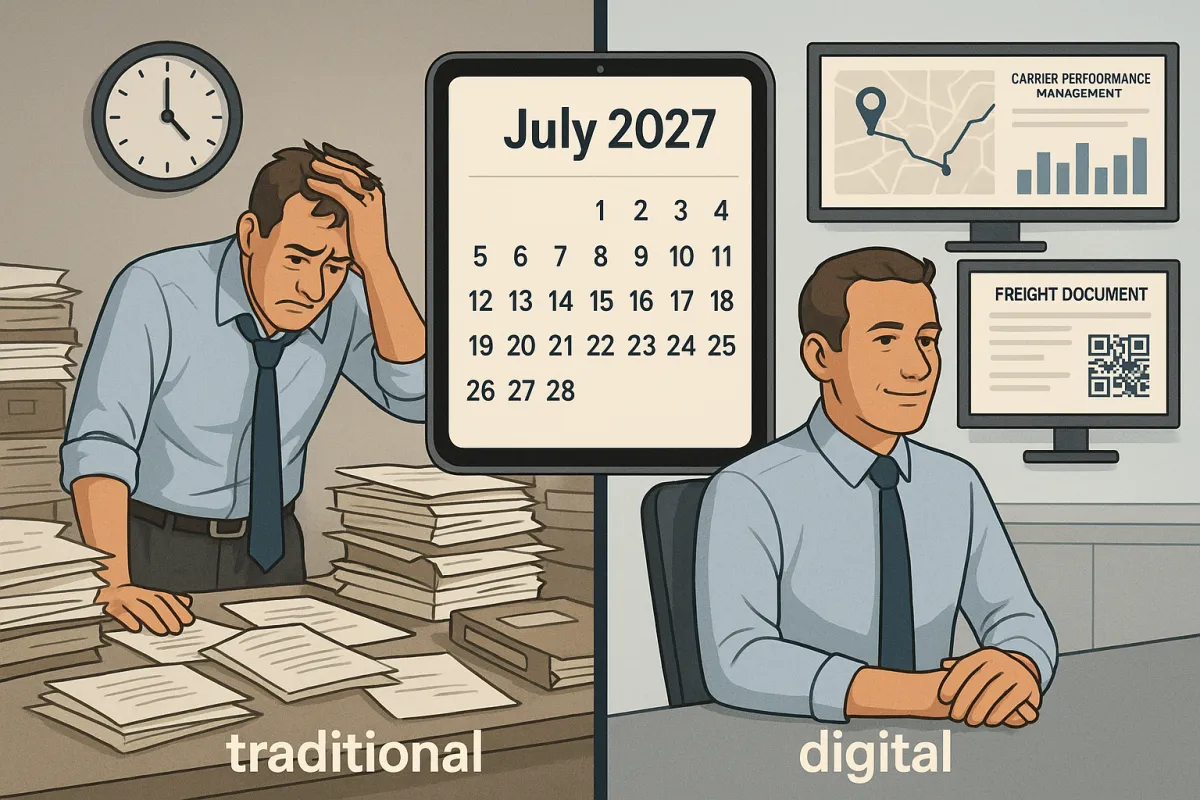
By September 2025, European shippers face a reality check. The Commission plans to adopt the remaining eFTI implementing specifications. These will provide detailed functional and technical requirements for the IT systems and services to be used by businesses (eFTI platforms and eFTI service providers) and the rules for their certification. Most aren't ready for what comes next.
Your current paper-based freight documentation system has 18 months left. As of 9 July 2027: The eFTI Regulation will apply in full. Member State authorities must accept information shared electronically by operators via certified eFTI platforms. The question isn't whether you need to prepare—it's whether your TMS platform selection will turn mandatory compliance into competitive advantage.
The eFTI Digital Documentation Mandate: What European Shippers Need to Know
The numbers tell the story of Europe's logistics challenge. It could save the EU transport and logistics sector up to €1 billion per year. Yet approximately 99% of transport documents used in Europe are still in paper form. The eFTI Regulation is set to transform freight transport within the EU by boosting efforts to replace paper-based documentation with electronic data in all transport modes. This digital shift will apply to road, rail, inland waterway, and air transport.
Business data will be housed on secure, certified IT platforms that can be easily integrated with companies' existing data management systems. This data will only be shared with authorities upon explicit inspection request, using unique access links in machine-readable formats such as QR codes. The system differs fundamentally from EDI—authorities scan QR codes to retrieve information from your certified platform rather than receiving documents directly.
The July 2027 Compliance Deadline and What It Means for Your Operations
By July 9, 2027, all freight operators within the EU will need to comply with the eFTI Regulation, making it mandatory for Member States to accept certified electronic freight documents. But implementation varies significantly across Europe. France, Spain, and the Netherlands already use electronic consignment notes (eCMR) domestically, while Ireland, Austria, and Croatia have yet to establish active projects.
The timeline creates strategic opportunities for early adopters. As of January 2026: eFTI platforms and service providers can start preparing for operations. Member States authorities may start accepting data stored on certified eFTI platforms for inspection. This voluntary period allows real-world testing without compliance risk.
Why Most European Shippers Are Approaching eFTI Wrong
Walk into most supply chain planning meetings today, and eFTI gets discussed as a checkbox compliance issue. The conversation typically focuses on minimum requirements: "What's the cheapest certified platform?" This approach misses the bigger picture entirely.
Here's what companies get wrong. They evaluate platforms solely on basic eFTI certification rather than operational capabilities. They assume all certified platforms offer similar functionality. They delay platform selection hoping requirements become clearer. Each mistake compounds the others, creating expensive implementation pressure as July 2027 approaches.
The reality? Platform selection determines your compliance success and operational efficiency. Companies treating eFTI as pure compliance typically choose platforms with minimal transport management capabilities, then discover they need separate systems for rate management, carrier onboarding, and shipment optimization.
The €1 Billion Opportunity Hidden in Compliance
Smart shippers recognize digital freight documentation as operational transformation, not regulatory burden. Estimates suggest that the eFTI Regulation could save the EU logistics sector up to €1 billion annually. By creating common standards and making systems work together, eFTI paves the way for fully paperless transport in the EU.
The operational benefits extend beyond paperwork elimination. Electronic documentation supports better route planning and real-time visibility, helping carriers and shippers improve fleet utilization and reduce empty runs. This digital shift will reduce administrative burden for transport operators and national authorities, increase data security, and facilitate compliance with EU and national freight regulations.
Companies implementing comprehensive TMS platforms with eFTI capabilities report ROI within 6–18 months, depending on implementation scale and initial investment. The savings come from reduced manual processes, improved carrier negotiations through better data, and enhanced supply chain visibility.
Essential TMS Features for eFTI Compliance
Not all TMS platforms handle eFTI requirements equally. Business data will be housed on secure, certified IT platforms that can be easily integrated with companies' existing data management systems. The platform must generate QR codes automatically for every shipment across all transport modes—road, rail, air, and inland waterway.
Core technical requirements include certified eFTI platform connectivity, automated document generation in machine-readable formats, and real-time data synchronization with authorities. QR code generation and machine-readable format requirements become mandatory by July 2027. Your TMS must generate these automatically for every shipment across all transport modes.
Advanced platforms offer additional capabilities that turn compliance into competitive advantage. Look for predictive analytics that optimize routing based on historical compliance data, automated carrier performance scoring that includes regulatory adherence, and exception management systems that proactively identify potential compliance issues.
Leading TMS providers like MercuryGate, Descartes, and Cargoson are already preparing eFTI-compatible solutions. The key is choosing platforms that combine regulatory compliance with transport optimization capabilities. Oracle TMS and SAP TM also offer enterprise-grade eFTI integration, though implementation complexity varies significantly.
Integration Requirements with Existing ERP Systems
Seamless ERP integration determines eFTI implementation success. Evaluate integration capabilities with your ERP and WMS systems. High interoperability ensures that the eFTI platform is compatible with existing ERP and TMS systems, with implementation taking place via digital interfaces that are integrated into existing ERP and transport management systems.
The integration must handle bi-directional data flow—order information flowing from ERP to TMS, shipping details and documentation flowing back. API capabilities become particularly important for companies with custom ERP configurations or multiple system environments. Modern APIs support real-time data synchronization, reducing the manual reconciliation that creates compliance risks.
Consider data standardization requirements carefully. eFTI mandates specific data formats for regulatory reporting, but your internal systems likely use different structures. The TMS platform should handle format translation automatically, maintaining data integrity while meeting regulatory specifications.
Strategic Platform Selection: Beyond Basic Compliance
Platform selection demands evaluation beyond eFTI certification. Consider the broader transport management capabilities that create operational value. Rate management functionality helps optimize carrier selection based on cost and service performance. Carrier onboarding tools reduce time-to-value for new transport partnerships. Advanced analytics provide insights that improve procurement negotiations.
Consider providers like Transporeon, Manhattan Active, and Cargoson that specifically address European compliance requirements. European-focused platforms often include built-in knowledge of country-specific regulations and carrier networks that global platforms treat as customizations. Descartes offers a comprehensive TMS with particularly strong capabilities for international shipping and compliance. The platform provides excellent tools for customs documentation, trade compliance, and multi-modal visibility.
Carrier connectivity deserves particular attention. Look for existing carrier connectivity - TMS solutions enable businesses to streamline freight management, route optimization, carrier selection, shipment tracking, and cost management across diverse transportation modes. Platforms with extensive European carrier networks reduce implementation time and provide more competitive routing options.
Evaluating Cloud vs. On-Premise for eFTI Readiness
Cloud deployment offers distinct advantages for eFTI compliance. Cloud-based solutions offer distinct advantages. Cloud-based solutions are often cheaper and more profitable for organizations that do not have the technical resources to build their own infrastructure, proven to be a more cost-effective option than on-premise deployment mainly because the licensing and data storage system costs are lower, and the technical labor is less.
Cloud platforms typically handle regulatory updates automatically, ensuring your system remains compliant as eFTI specifications evolve. This eliminates the manual update cycles that create compliance gaps in on-premise deployments. Cloud infrastructure also supports the scalability requirements for peak shipping periods without capital infrastructure investments.
Security considerations matter particularly for eFTI compliance, where data must meet EU regulatory standards. Leading cloud TMS providers offer SOC 2 Type 2 compliance and robust data encryption, meeting the security requirements for regulated freight data. According to Gartner, the adoption of cloud TMS has been steadily increasing, with over 50% of TMS deployments expected to be cloud-based by 2025.
Implementation Timeline and Action Steps
Your preparation timeline should align with regulatory milestones and business planning cycles. In parallel, the European Commission is developing the technical specifications for market-facing eFTI platforms. A first draft of the Implementing Act for these platforms was shared with Member States in March 2025. In response to Member State requests, the Commission is now closely coordinating with private sector stakeholders through the Digital Transport and Logistics Forum (DTLF)—a group of around 100 representatives from logistics firms, IT companies, and trade associations.
Begin platform evaluation immediately. Request demos from certified providers and assess integration requirements with your current systems. Start carrier conversations about eFTI readiness—some carriers are further ahead than others in preparation. Plan staff training for the voluntary period starting January 2026.
Industry experts acknowledge implementation realities. Full industry alignment may take longer than the regulatory timeline suggests, with many experts seeing 2029 as the point when paper CMRs finally disappear from European logistics. This extended transition period creates competitive advantage opportunities for early adopters who achieve seamless digital operations before competitors.
Building Your Business Case for eFTI-Ready TMS Investment
Link compliance requirements to broader operational improvements in your business case. Calculate savings from reduced manual documentation processing, improved carrier negotiations through better data visibility, and enhanced supply chain optimization capabilities. Include risk mitigation value—non-compliance penalties and operational disruptions create significant downside risk.
Most companies see TMS ROI within 6–18 months through transportation cost optimization, improved operational efficiency, and reduced administrative overhead. eFTI compliance adds regulatory risk mitigation and competitive advantage as additional value drivers. The total investment typically pays for itself before the July 2027 mandatory deadline.
Position the investment as digital transformation rather than compliance expense. Companies that approach eFTI strategically build platforms capable of supporting future regulatory requirements and operational innovations. The eFTI framework may expand beyond freight documentation. The eFTI exchange environment may expand to cover compliance with rules related to drivers or vehicles, potentially integrating with other systems for a comprehensive authority interface. This suggests future integration with driver hours regulations, vehicle inspection requirements, and emissions compliance.
Your eFTI preparation starts with platform selection that combines regulatory compliance with operational excellence. Choose wisely—this decision shapes your competitive position for the next decade of European freight operations. The companies that get this right won't just meet regulatory requirements; they'll use digital freight documentation as the foundation for superior logistics performance.
